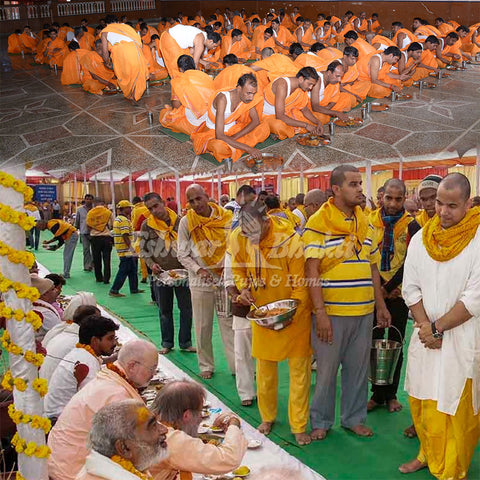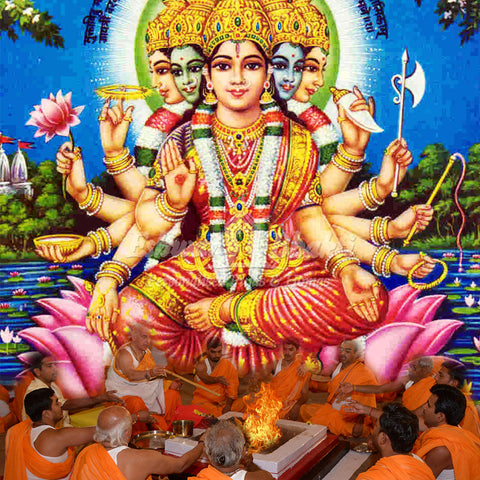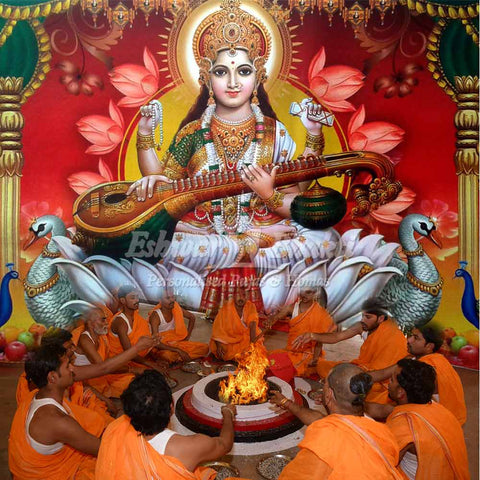Lord Brahma
 Brahma is one of the Trimurti: The highest triumvirate in the entire Hindu pantheon. Sanatan Dharma worships many millions of different gods and goddesses. Brahma, Vishnu and Mahesh form the Trimurti, where each of them is a manifestation of the underlying Ultimate Brahmn. Brahmn that is both infinite, and eternal. Brahma is the God of Creation, magic and wisdom.
Brahma is one of the Trimurti: The highest triumvirate in the entire Hindu pantheon. Sanatan Dharma worships many millions of different gods and goddesses. Brahma, Vishnu and Mahesh form the Trimurti, where each of them is a manifestation of the underlying Ultimate Brahmn. Brahmn that is both infinite, and eternal. Brahma is the God of Creation, magic and wisdom.
Origin: Brahma is synonymous to the Vedic God Prajapati. In the Puranic texts, there are conflicting accounts of the origins of Brahma. One story places his birth in the Kshirsagar, the cosmic ocean of milk, where God Vishnu resides on his lotus throne. Brahma emerged from the navel of a sleeping Vishnu and then created the universe, the egg of Brahma, or the Brahmand. Other accounts mention Brahma as being a ‘swayambhu’, which means the one born of his own volition.
Unlike God Vishnu, Brahma doesn’t take avatars. There are stories, during the Satya-yuga, of him descending upon the mortal world, but they were, in each of these cases, a direct manifestation of his own true being.
Significance and Role: God Brahma is the creator of this universe. Our existence starts in the Day of the Brahma and ends in the Night of the Brahma. A day of Brahma lasts the lifetime of a universe. When the Night arrives, all creations end. The world that we see, breathe and live in, disappears down an extra-cosmic abyss. And the material world ceases to exist.
Apart from being the Creator, God Brahma is also the original bestower of wisdom. The four Vedas came out of the four mouths of Brahma. All of us, including trees and animals, trace our lineage back to Brahma. He is the original Patriarch of the world.
Brahma is the source of magic. Everything he says, has the force of creation behind it, and it always comes true. He is the conduit behind the transfer of energy that happens during the yajnas. He is the base for the system of exchange between Devas, the divines, and Martyas, the mortals.
Benefits of worshipping Brahma: A pleased God Brahma can grant you any wish that you can think of, including true immortality (within the bounds of this universe), something that none else can do. However it is difficult to please him because of many reasons. One being the difference in the timescales of Brahma and the mortal world. Epochs may pass before God Brahma turns any of his four heads towards you. Another reason being Brahma chooses to remain aloof far too often making him less and less likely to act upon your grievances especially if targeted against his other sons and daughters. The ancient patriarch rarely takes sides.
His Powers and Vehicle: Brahma is the Supreme Creator. He is the source of this world. The prime mover. Within this universe, he cannot be overridden by anyone. Because of this he is often called ‘vidhi’ and ‘vidhata’. He is the fate himself. There are stories of him granting extraordinary boons to those who could complete the grueling penance of pleasing him.
God Brahma rides a pristine white swan. The swan represents the unblemished truth of this existence.
Artifacts associated with Brahma: God Brahma being the creator rarely needs to fight. Almost all beings want to be in his good books and generally are. It is not in the nature of the creator to sit in any judgement of his own creations and creatures. He is content to let the world be as he waits for his Night to come. When the universe finally disappears into nothingness. The cycle of existence turns upside down as the day turns into the night. On the timescale of Brahma. It gives a new meaning to the phrase: All in a day's work. And the day is now over and God Brahma is finally free to rest.
Brahmastra is a weapon commonly associated with Brahma, however, Brahma doesn’t carry it himself. Brahmastra is a blessed astra granted only to a handful of the greatest warriors ever to have walked the face of this world. Arjuna, Drona, and Lord Rama, all carried this devastating weapon.
Generally Brahma wields no weapon in any of his four hands. Occasionally he is represented with a pasham (a sceptre with a whiplash at its end). It is said that he used the pasham to herd his creations during the early days of creation, when he was still experimenting with the world.
God Brahma is invariably shown holding a bundle of palm leaves, symbolizing the Vedas. A bead garland for prayers, and a kamandala (pot of water with spoon inside) containing the water the Brahma sprinkles over his creation. Water that is the source of all magic in the universe.
God Brahma takes Goddess Saraswati as his consort. Saraswati is his second wife after Satrupa. Brahma has many sons and daughters. They are all his ‘manas-putras’ and ‘manas-putris’, having arisen from the thoughts of the god. His sons include Narada, Daksha, Himavan, Jambavan, Atri, Svayambhuva Manu, the Four Kumaras, Marichi, Rudra, Vashishtha, Chitragupta, Kaamdeva, Brahmaputra, Sindhu and Mrityu.
All events that come to pass within the Brahmanda, the universe, imply approval of Brahma. Nothing can happen without God Brahma’s knowledge and acknowledgement. This assumes great significance for those on transcendental journeys. Any progress significant or insignificant, can only happen when Brahma approves their ascension through specifically preordained eventualities.



